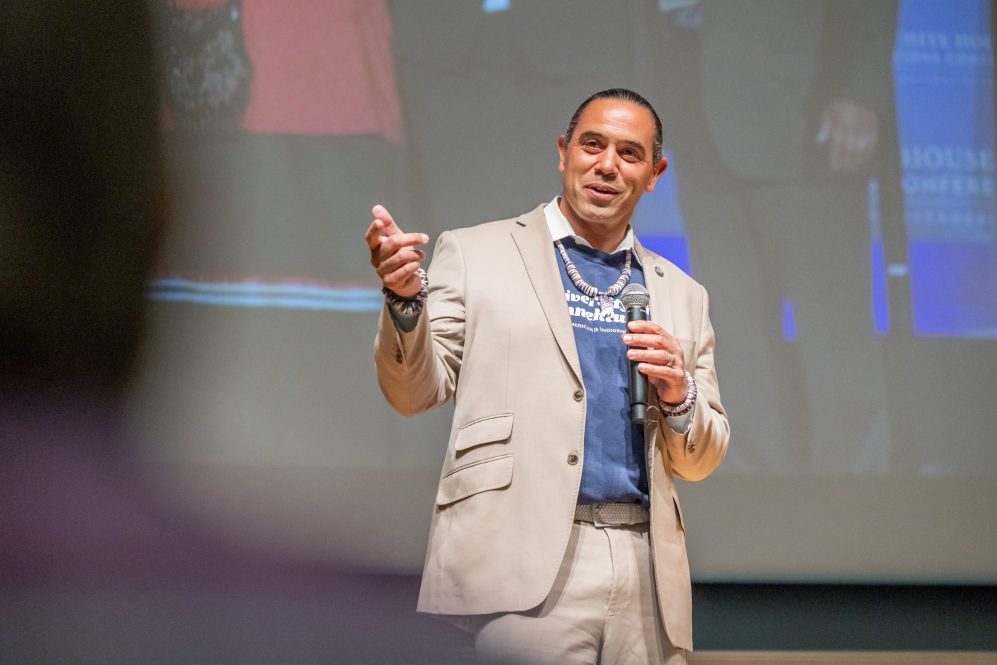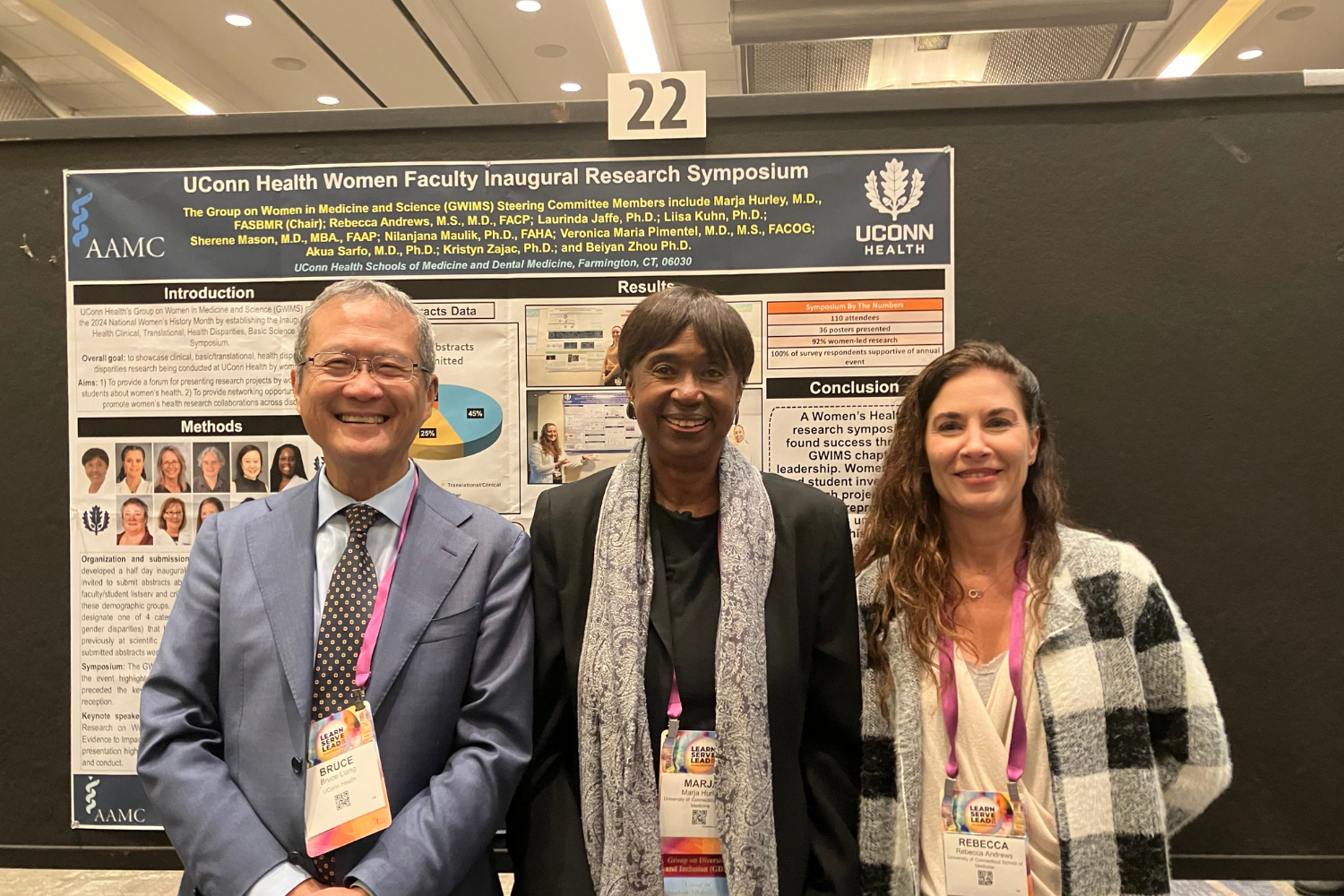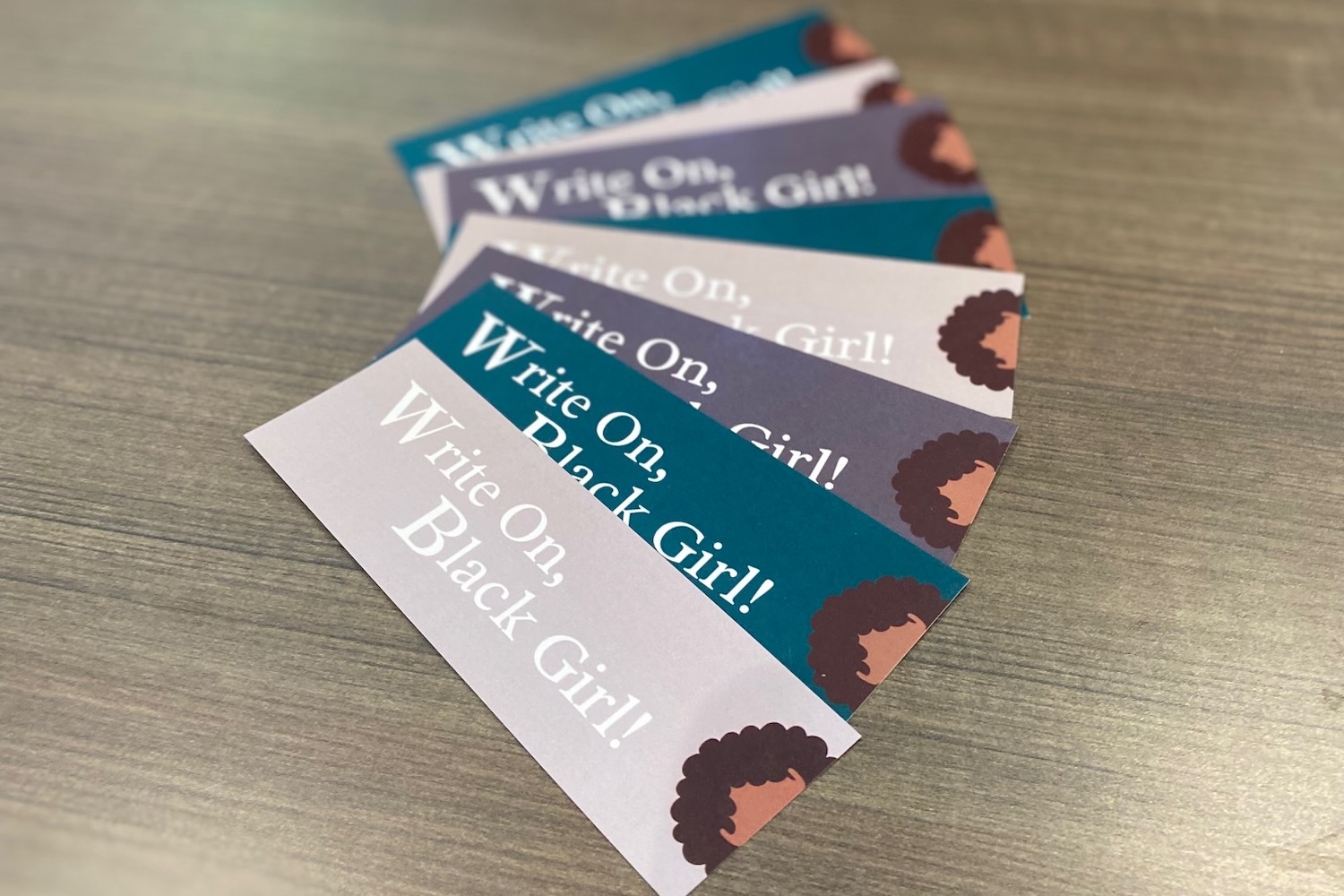This past spring, Mashantucket Pequot Tribal Nation Chairman Rodney Butler ’99 (BUS) addressed a large audience of students, faculty, and staff at the Student Union Theatre. One member of the audience paying especially close attention was Samantha Gove ’24 (CLAS), a member of the Mashantucket Pequot Tribal Nation who worked extensively with UConn’s Native American Cultural Programs during her time in Storrs. Shortly after Butler’s visit, he and Gove connected over video call for a conversation about Butler’s time at UConn, what he’s learned in two decades of leadership in the Nation, and what he wants Native students to keep in mind. The interview has been edited and condensed for clarity.
Gove: Why did you choose UConn? And what was it like when you were an Indigenous student at UConn when you were an undergrad?
Butler: UConn, and I hate to admit this, it was initially not my top choice. I was looking at some engineering schools that were a little more niche and that had decent football programs. And so I was thinking with the endgame in mind of being an engineer, which clearly isn’t where I landed. Then I ended up talking with the football coaches at UConn, and they were talking about their transition and hyping up that we’re going to go from the small-time program to a big-time program, and Skip Holtz was coming in. I felt like, why not give it a shot? Even though I wasn’t offered a scholarship, I was preferred walk on. And so I knew I had to fight and work harder than everybody else to get my shot. And, as an Indigenous student, I was alone. There was no Indigenous community at UConn when I was there. But, being a part of the football team, regardless of your race, color, whatever, when you’re on the team, you’re a Husky, so that was that was my community. Football and academics were really my focus, in addition to my high school sweetheart and future wife attending UConn with me, we were living together halfway through our sophomore year. So it wasn’t quite the robust experience that you all are having today, primarily from the efforts of you and others that really brought the Indigenous community to life at UConn.
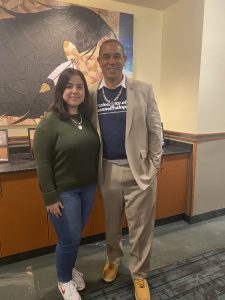
Gove: You served on the Tribal council from 2004 to 2009 and have been serving as chairman of the Mashantucket Pequot Tribal Nation since January 2010. Did you always feel a desire to join Tribal council or become chairman?
Butler: I’ll be honest: absolutely not. It was never an aspiration of mine. Never on my radar. I mean, politics at large was never something that I was interested in. I was never part of any student government in middle school or high school. I grew up thinking I was going to be an architect-slash-engineer, and then later transitioned to investment banking. Once I left college and started working for the Nation, I started off as a financial analyst at the casino, and that was just going to be a placeholder until I ended up on Wall Street somewhere. But the Tribe was very, very generous and offered opportunities that encouraged civic engagement. We have committees that report up to the Tribal council, similar to what you see in a state legislature, comprised of tribal citizens. The first committee I landed on wasn’t even a finance committee. It was the administrative support committee, and it was just foreign to me. But as I got into the mix of that and working with the community, I started to see the opportunity to make a difference. And at some point, some of my family started prodding me like, ‘Hey, you’re pretty good at this. We know, you’re young, but you’re pretty good at this. Would you consider running for council?’ At that time, I was running our investment group that oversaw a portfolio of our non-gaming businesses and was happy where I was at. But I put my name in, just thinking, sure, I’ll run for council, but if I don’t win, I’m good where I’m at, and we’re doing some good things for the tribe. Luckily, I guess, or unluckily (laughs), I won. And it’s been, as you said, almost 21 years now that I’ve served in various capacities and elected positions. I’ve gone through seven election cycles, which is pretty incredible when you think about it.
Gove: It definitely is. And as chairman, you have a lot of different responsibilities. So what does a typical day of work look like for you? And what’s your favorite part of your job?
Butler: As chairman, I serve at the pleasure of the community and, among my peers on our seven-member council. So really, I’m just the spokesperson of the community and I navigate the council and our decision-making process, but it’s a democratic process and I’m just one vote of seven. Day to day can be really different, whether it’s interacting with the council on various governance issues and passing new trabel laws, or reviewing individual constituents’ matters regarding their home heating oil or an issue at the daycare, something along those lines. Just the other day, we were inspecting our playground equipment, and then later that day, I was headed up to Hartford to meet with the Speaker of the House and then was on a call with the Governor. Just this past week, I flew down quickly for a day trip to D. C. and met with members of the Senate and the House, and occasionally I’ll have meetings with the President. I love everything about it, because it’s so all-encompassing and so rewarding in so many respects. It’s a lot to do in one job, but we’re serving a Nation here.
Gove: That leads really well into our next question, which is, What has been your most rewarding career accomplishment?
Butler: The accomplishments that we have are as a group; certainly no individual can take credit for any single one of those. So, just this interview here, it’s an accomplishment for our community that you’ve (Sammi) had success and you’re graduating college this year. That’s what’s most rewarding: to see that we have so many educated, healthy, and productive citizens from Mashantucket. That’s what we’re working for every day. Politics is a thankless job, right? If you’re going into politics because you want praise and appreciation, forget it. You’re doing the wrong thing in life. If you’re going to do it, you do it for the right reasons. Seeing individuals like yourself and so many others in our community that just continue to grow and prosper and contribute not only to Mashantucket, but also to the broader society, that’s what’s rewarding.
Gove: Thank you. And that really, really resonates. I want to transition to talk a little bit about your leadership journey. You have had such a remarkable trajectory throughout your life. And a lot of us Native students at UConn talk a lot about how we feel like we have imposter syndrome, just transitioning between such different communities, especially in an institution of higher education. I was wondering if you’ve ever felt imposter syndrome and if you have any advice as to how to get through that.
Butler: Although you would never guess this, I was the most quiet kid in the room. I mean, I sat at the front of the bus and spoke to nobody, kept my head down and worked hard. In saying that, I was raised to be confident in myself, even though I didn’t project it in that way. I was okay being by myself. I think that component of my personality doesn’t allow me to have imposter syndrome. I’ve always felt like I was in the right place at the right time. Of course, doubt can set in sometimes, whether it was on the playing field, or the academic classroom, or in the workplace, or when I was elected to council at a young age. I was 26 and meeting with other Tribal leaders, and they thought I was the assistant or something, helping out with the council. But I love learning, so if there were ever moments where I was questioning my own capabilities, I’m a very quick study. Almost 21 years in this position, and I’m in D.C. this past week, interacting with other Tribal leaders and still learning new things.
Gove: I love that mindset. You are a role model for so many people from so many different communities, so a lot of students at UConn are curious about who inspires you.
Butler: I appreciate that. I think my very first election slogan was ‘Leading By Example,’ and in my mind I hadn’t even been a leader yet (laughs). But that’s just the way I feel like we have to be. I mean, there are billions of us on the planet. So there are a lot of good people out there, and everybody’s inspiring in their own way. But, I think of those who are breaking barriers, and one who comes right to mind is the U.S. Treasurer, Chief Lynn Malerba. She was one of the first tribal leaders to reach out to me after I was elected chairman and really show me the ropes. She has just been a great sounding board for me over the years. And then another inspiration is Secretary of the Interior Deb Haaland. I knew her before she was a member of Congress, and to see where she was to where she is now is incredibly inspiring. I remember the day she called me and said, ‘Hey, Chairman, I just got tapped by the White House to be Secretary of the Interior of the United States. What do you think?’ I’m like, what do I think? They’re asking you, not me (laughs)! Just seeing what she does in a white, male-dominated world, becoming the first female Native secretary of interior, is just absolutely incredible. And I’ve seen her in those situations where people are just grilling her and trying to take advantage of what they think is her weakness, and she just powers through. She’s fierce and fearless.
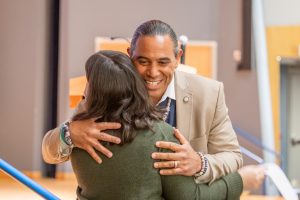
Gove: What you would like to see colleges and universities do better to meet the needs of Native students? Because we’ve seen such a difference in what the Native community means at UConn and so many other universities now, compared to when you were a student. And it’s still not where it needs to be. Things are much better, and that’s something to be grateful for, but there’s still so much further to go.
Butler: I think what UConn has done, and what you helped inspire UConn to do, is a great example of where universities should be going: actually investing in the Native community and building that space for our students to encourage each other and support each other, but also encouraging them to engage with the broader community. And I think that goes both ways. It starts with our students recognizing and celebrating their indigeneity, but not letting that define your goals and your college experience in totality. And on the other end of that, it’s up to the university to educate non-Native students about who we are, the contributions we’ve made, the sacrifices that we and our ancestors made, and emphasizing the importance of understanding who we are. If the rest of the university has no idea that there’s a Native and Indigenous program and population, then the university isn’t succeeding. What I’ve found over the last two decades of leadership, is that educating the general public about who we are is so impactful in making progress for our communities. The more that universities can educate the entire student population about Native issues, about our rights, and about building those future partnerships, the better off our future generations will be.
Gove: What advice would you give to Indigenous students who are currently in college?
Butler: Well, I have two college kids of my own who don’t listen to me right now (laughs), so that’s a tough one. But, as individuals, you should be confident as an Indigenous student, as a Native student. Just a generation or two before you, it wasn’t acceptable to celebrate that, you got looked at and treated differently. And so the fact that you can celebrate that now: own it. But as I said, don’t let it define you in totality. The world depends on people working together and there are many different communities that we parallel in our struggles and our opportunities. As Native people, it’s going to take us working with those communities to elevate our own communities. But most importantly: believe in yourself and find your success. The Creator put you in this situation because you can handle it. You’re there for a reason. You didn’t get there on some special grant because you’re Native, even if people try to tell you that. You belong there. Don’t forget that.
